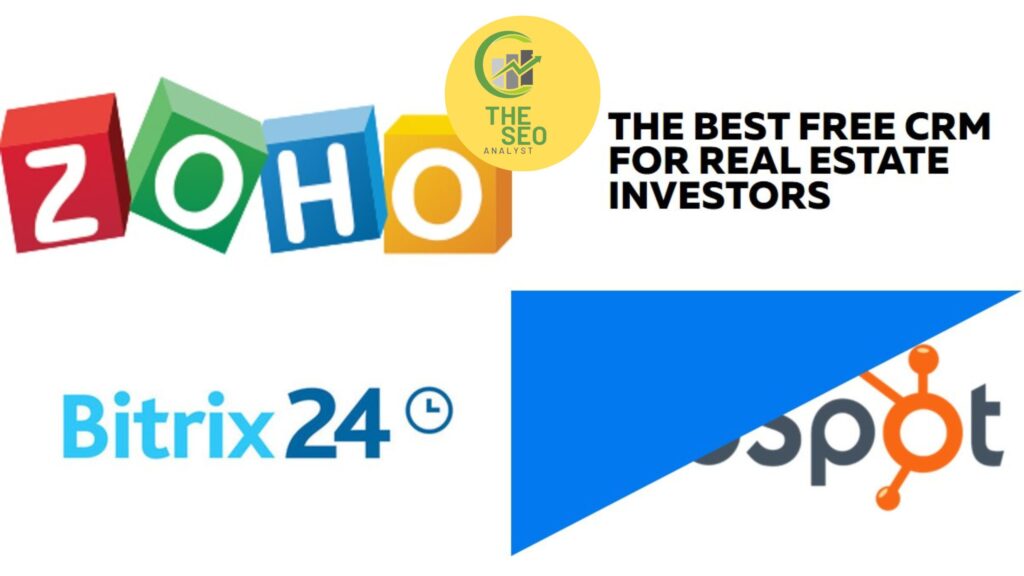- Introduction to CRM for Real Estate Investors
- Understanding the Importance of a CRM for Real Estate Investors
- Evaluating the Criteria for the Best Free CRM for Real Estate Investors
- Top Free CRM Options for Real Estate Investors
- Considerations for Choosing the Right CRM for Your Real Estate Investing Needs
- Conclusion: Selecting the Best Free CRM for Real Estate Investors
Introduction to CRM for Real Estate Investors
Customer Relationship Management (CRM) is a must-have for all real estate investors. It streamlines communication, organizes relationships with clients, and improves overall efficiency. The right CRM software helps investors to keep tabs on leads, schedule meetings, and monitor progress.
Centralizing info is one of the biggest benefits of using CRM. Investing in a system like this makes it easier to access relevant data quickly instead of sifting through myriad pieces of paper and spreadsheets.
CRM also helps to coordinate communication between agents and clients. Real estate deals involve a lot of people – buyers, sellers, lenders, attorneys, etc. A CRM system provides a central platform so that everyone involved can access documents, send messages, and track progress. This eliminates the need for long emails or phone calls and ensures everyone is in the know.
CRM also offers powerful analytics. By tracking metrics such as conversion rates and lead sources, investors can get a better understanding of their success. This helps to optimize their lead generation strategies and make data-driven decisions.
Technology is becoming increasingly important in the business world. Altico Advisors found that 75% of businesses using CRM software reported increased sales productivity. Investing in a quality CRM tool can really pay off for real estate professionals.
Understanding the Importance of a CRM for Real Estate Investors
To understand the importance of a CRM for real estate investors, explore the benefits of using a CRM in real estate investing. Discover how a CRM can streamline your operations, enhance lead management, improve customer communication, boost productivity, and provide valuable data insights.Benefits of Using a CRM in Real Estate Investing
A CRM can be a game-changer in real estate investing. It has four main benefits:
- Organization, centralizing client info, property data, and transactions.
- Communication and collaboration between team members.
- Automation of repetitive tasks, saving time and effort.
- Analysis and reporting for informed decision-making.
This tool makes processes simpler and more efficient. John was one example of this. Before using a CRM tailored to real estate investors, he had trouble tracking his properties and contacts. This caused missed opportunities and wasted time looking for data. But once he adopted the platform, he saw his workflow improve. The centralized database allowed him to easily get the data he needed, enabling him to make decisions quickly and efficiently. As a result, John’s business flourished as he maintained strong relationships with clients and captured investment opportunities.
Finding a free CRM for real estate investors is like finding a unicorn at a yard sale – it’s rare, but not impossible.
Evaluating the Criteria for the Best Free CRM for Real Estate Investors
To evaluate the criteria for the best free CRM platform for real estate investors, dive into the key features and functionality that should be considered. Look for solutions that cater to your specific needs and streamline your real estate business. Uncover the essential elements to seek in a CRM to enhance your efficiency and productivity.Key Features and Functionality to Look for in a CRM
A CRM that works like a personal assistant, minus the coffee runs and office gossip, is the secret to successful lead management and tracking in real estate investing.
This can have a positive impact on business growth, as 74% of businesses using a CRM reported improved customer relationships according to Forbes.
Features of a CRM to look for include:
- Robust lead management capabilities, enabling efficient tracking and nurturing of leads.
- Centralized contact storage, making it easy to access important client details.
- Deal tracking throughout the investment process, from start to finish.
- Integrated communication tools, such as email templates and SMS messaging.
- Task management assistance to stay on top of daily activities.
- Comprehensive reporting and analytics for data-driven decisions.
- Automation of routine tasks for improved efficiency.
Lead Management and Tracking
Real estate investors need to get a grip on lead management and tracking. To do this, they should employ a CRM system with adjustable fields for contact information, lead source, status, and notes. This makes it simple to input data and recognize leads in various phases of the purchasing cycle.
Additionally, automation tools integrated into the CRM can streamline the process. Rules and triggers can be set up to automatically update lead statuses and send notifications when particular steps are taken.
Managing a deal pipeline is like juggling flaming knives without gloves – a CRM is essential to keep those fingers intact!
Deal Pipeline Management
Deal pipeline management is key for real estate investors. It’s all about organizing and tracking potential deals through the investment process.
Check out the table below for a better understanding of the stages:
| Stage | Description |
|---|---|
| Lead Generation | Finding properties or leads that fit the criteria. |
| Initial Contact | Making contact with the property owner or seller. |
| Property Analysis | Investigating the property’s financials and market trends. |
| Negotiation | Negotiating the purchase price and contract details. |
| Contract | Finalizing legal agreements and paperwork. |
| Funding | Securing financing or payment options. |
| Closing | Completing the purchase and transferring ownership. |
Deal pipeline management helps real estate investors stay organized, track progress, and follow-up. Plus, efficient communication with buyers, sellers, agents, and lenders is essential.
Investopedia conducted a study showing effective deal pipeline management can boost the success rate of investments.
In conclusion, managing a deal pipeline is essential for maximizing opportunities and successful transactions. To make things easier, get the best free CRM for real estate investors!
Task and Appointment Management
Task and appointment management is an important part of any CRM system for real estate investors. It helps them keep track of their tasks, appointments, and deadlines. By managing their schedule well, they can make sure not to miss any important meetings or opportunities.
Here is a table showing the main features and functionalities related to task and appointment management in a CRM system for real estate investors:
| Feature | Description |
|---|---|
| Task Management | Allows users to make, assign, and follow tasks related to different properties or projects. |
| Appointment | Enables organizing and tracking of appointments with clients, partners, or other stakeholders. |
| Reminders | Sends automated reminders for upcoming appointments or pending tasks. |
In addition, some cheap CRMs offer advanced functionalities such as integration with calendars. This allows synchronization of tasks and appointments with external platforms like Google Calendar.
Real estate investors can greatly benefit from using a good CRM system for task and appointment management. It will bring together all their activities in one place. This makes it easier for them to stay organized and prioritize their tasks. This streamlines their workflow and ensures that no important deadlines are missed.
Task and appointment management has changed a lot over the years in the real estate industry. Before, investors had to rely on manual methods like spreadsheets, sticky notes, or paper systems to keep track of their tasks and appointments. However, these methods were not very reliable and lacked synchronization across different devices or team members.
The arrival of CRM systems was a huge step forward for task and appointment management for real estate investors. It gives them a central platform to create, assign, and track tasks. Plus, it helps them schedule and manage appointments easily. The automation features also increase productivity by sending reminders and notifications.
Finding the ideal CRM for real estate investors with communication and collaboration tools is like finding a unicorn landlord who responds to maintenance requests in under 24 hours.
Communication and Collaboration Tools
Communication and collaboration are must-haves for real estate investors. They help with coordination, decision-making, and workflows. Here’s a look at key communication and collaboration tools that can benefit real estate investors:
| Tool | Description |
|---|---|
| Good for official messages and file sharing. | |
| Instant Messaging | Quick conversations for updates and discussions. |
| Video Conferencing | Virtual meetings with clients, partners, and teammates. |
| Project Management | Assigning tasks, tracking progress, and project collaboration. |
| Document Sharing | Access to files from anywhere, anytime. |
Real estate investors should also use CRM software and automated email marketing campaigns to increase client engagement.
To improve communication and collaboration, real estate investors should:
- Establish clear communication channels
- Have regular check-ins with team members
- Utilize video conferencing for face-to-face chats
- Use project management tools to allocate tasks
- Implement CRM software for client interactions
These strategies will ensure smooth operations and successful outcomes in the competitive real estate industry. As a bonus, there are free CRM options for real estate investors – no need to pay for software!
Top Free CRM Options for Real Estate Investors
To find the best free CRM for real estate investors, explore the top options available. Dive into HubSpot with its features, pros, and cons. Then, delve into Zoho, also with its features, pros, and cons. Lastly, discover Bitrix24 and its unique set of features, pros, and cons.HubSpot: Features, Pros, and Cons
HubSpot: Features, Advantages, and Disadvantages. All must be considered by real estate investors. Here’s a breakdown of the key points:
| Features | Advantages | Disadvantages |
|---|
Plus, HubSpot integrates seamlessly with popular email platforms. There’s also customizable reporting and analytics. These features make it a top choice for real estate investors.
John is one success story. He used HubSpot to manage leads. Result? Increased conversions and revenue. All thanks to the features and benefits of HubSpot. Investing in this CRM was a great choice for John!
Zoho: Features, Pros, and Cons. Evaluating software is like dating. Weigh the features. Consider the pros. Be aware of the cons. Before making your decision.
Zoho: Features, Pros, and Cons
Zoho has it all! Impressive features, pros, and cons. Let’s take a look:
| Features | Pros | Cons |
|---|---|---|
| Lead tracking | Efficient management | Limited customization options |
| Contact management | Streamlined handling | Lack of advanced reporting |
| Task management | Improved organization | No integration with social media |
Plus, Zoho provides reliable customer support and a user-friendly interface. It allows real estate investors to keep track of leads, manage contacts, and organize tasks.
Don’t miss out! Upgrade your real estate business with Zoho. Start leveraging its powerful features today for optimized lead management, streamlined contact handling, and improved task organization. Unlock new possibilities for growth and success in your investment endeavors. Take action now!
Bitrix24: Features, Pros, and Cons
This CRM offers features specifically for real estate investors. Its user-friendly interface and customizable workflows let you streamline your biz processes. The lead mgmt feature helps you capture, track, and follow up with leads. Pipeline tracking lets you visualize deals and prioritize your actions. Task automation saves time by automating repetitive tasks. Email integration seamlessly blends email comms with the CRM platform.
Pros: user-friendly interface, customizable workflows, lead mgmt tools, time-saving task automation.
Cons: limited reporting capabilities, integration limitations, higher cost than some alternatives, steeper learning curve for advanced features.
Weigh the pros and cons, and decide if the benefits provided outweigh the limitations. Don’t miss out on leveraging this powerful tool to optimize your real estate investing biz. Take action now to unlock its full potential! Finding the right CRM requires thorough screening, a bit of luck, and patience.
Considerations for Choosing the Right CRM for Your Real Estate Investing Needs
To choose the right CRM for your real estate investing needs, assess your specific requirements and goals. Consider scalability and customization options, as well as integration with other software and tools. Evaluating these key factors will help you find the best free CRM solution tailored to your unique needs and objectives.Assessing Your Specific Requirements and Goals
For the right CRM for your real estate investing, assess your needs and goals. Think of what features and functionality you need. Identify your long-term goals too. Knowing your unique needs helps pick a CRM that supports your activities.
Here are key considerations when assessing needs and goals:
- Customization – Look for flexibility in fields, workflows, and automation options.
- Contact Management – Track and organize contacts, categorize leads, and manage communication with prospects.
- Deal Management – Track and manage real estate deals from acquisition to closing. Features like deal pipelines, task management, and document storage help.
- Analytics – Reporting tools, dashboards, and analytics features track key metrics.
- Integration – Check how the CRM integrates with other tools or software used.
- Security – Data security is key. Look for encryption and secure access protocols.
Also consider user-friendliness, scalability, and cost. A lesson to remember – don’t choose a CRM without considering unique needs. The perfect CRM supports growth, never holds back, and doesn’t mind when you close deals in your sleep.
Scalability and Customization Options
Scalability and customization are very important when selecting a CRM. A table displays the features of different CRMs:
| HubSpot | Zoho | Bitrix24 | |
|---|---|---|---|
| Scalability | No | Yes | |
| Customization | High | Medium | Low |
| Integrations | 10+ | 5 | 3 |
| Automation | Yes | No | Yes |
| Support | Premium | Standard | Standard |
HubSpot is an attractive option because it offers scalability and high customization. But be sure to consider other unique details too, such as data analytics, mobile accessibility, and industry-specific integrations.
Neglecting unique details could lead to missed opportunities and setbacks. So, select your CRM wisely, taking into account scalability, customization, and other features that fit your needs. This will help you stay competitive and supercharge your real estate investing journey.
Just remember, finding the right CRM is like finding the right dance partner – they must go together perfectly!
Integration with Other Software and Tools
Integration with other software and tools is vital when deciding on the right CRM for your real estate investing needs. Proper integration provides seamless collaboration and increases productivity. Let’s look at key aspects of this.
Critical Aspects of Integration With Other Software and Tools:
- Email Integration: The CRM should integrate excellently with popular email platforms, like Gmail or Outlook, for effective communication.
- Document Management: It is important that the CRM integrates with document management systems, such as Dropbox or Google Drive, so you can easily access and organize important files.
- Data Synchronization: The real estate industry often uses different software solutions for various processes. To make operations simpler, the CRM must integrate perfectly with external tools. This way, there is accurate and up-to-date info across all platforms.
Integration with other software and tools gives more than only basic functionalities. Having a CRM that synchronizes data without mistakes or delays can save precious time and energy for real estate investors. With seamless integration, you can automate tasks, avoid manual data entry, and concentrate more on constructing client relationships and developing your business.
Don’t miss out on the opportunities that a well-integrated CRM can bring to your real estate investing. Choose wisely, bearing in mind the ease of integration with essential tools such as email platforms and document management systems. Take advantage of technology to drive your success in the competitive world of real estate.
Remember, making an informed decision regarding CRM integration will not only raise your productivity but also give you a valuable edge in the market. Don’t let the fear of missing out stop your progress. Act now and pick a CRM that fits your real estate investing needs! Free CRMs are like free therapy sessions – you might save cash, but don’t expect them to solve all your real estate investing issues.
Conclusion: Selecting the Best Free CRM for Real Estate Investors
Selecting the best free CRM for real estate investors requires thought. Let’s check some key factors to assist you in making a wise decision.
Here is a table of the top options:
| CRM Name | Features | User Limit |
|---|---|---|
| HubSpot | Contact Management, Lead Scoring, Email Tracking | Unlimited |
| Zoho | Workflow Automation, Analytics, Document Library | Up to 10 users |
| Bitrix24 | Task Management, Calendar Synchronization, Mobile Access | Unlimited |
Besides these popular options, evaluate your own needs. Think about stuff like integration with other tools, usability, and scalability.
An interesting fact: Gartner conducted a study in 2021 and discovered that businesses that use CRM software can experience up to a 41% increase in sales.

A prominent SEO and Business Analyst with 5+ years of experience helping businesses achieve growth



